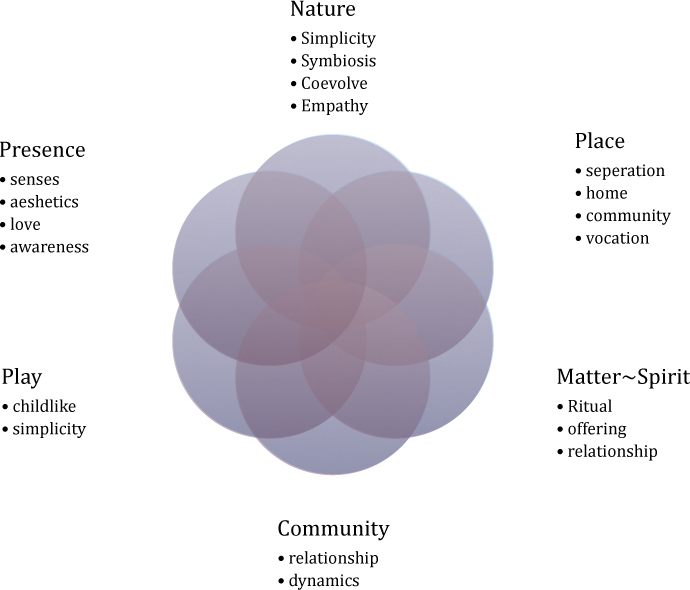Ecopsychology Internship
ANTIOCH UNIVERSITY MCGREGOR
IMA 552
ECOPSYCHOLOGY INTERNSHIP
Course Description:
This course involves an internship where students live in an eco-community, learning skills for living on the land and in community. It is a course that will demonstrate ecopsychological principles in action, incorporating various methods for reconnecting psyche with the earth. The skills learned and the lifestyle encouraged, supports participants in living an integrated human life- integrated with the land around us, with each other in community, and with our own bodies and spirits. It is a way to experience and discover foundational elements of place-based living. To meet these ends students have the opportunity to develop a broad spectrum of skills, incorporate organic farming and permaculture, natural building, homestead skills, ancient life skills, and modern alternative technologies, community process, yoga, expressive arts and more… We will learn how to live and work together with each other and the earth, empowering our selves and our communities. Throughout the course of the program, apprentices will live and work together on an off the grid farm community outside of Hood River, Oregon, called Mount Defiance Forest Farm. Together we will grow an abundant organic garden, learn various techniques to preserve the produce so we can enjoy it year round, run a market garden and CSA, learn natural building techniques through building a light straw clay building and working with cob, learn and practice various primitive skills like hide tanning and willow basketry, and much more. The purpose of the Mt. Defiance Forest Farm Education Program is to empower students so that they can take care of their basic needs and so that they can make their own choices about the lives they live.
The participants will gain a deep lived understanding of one model of sustainable living, and apply ecopsychological practices to their own life and study. They will critically evaluate the strengths and weakness of this particular model, practice and lifestyle through the ecopsychological lens. The following are possible areas of evaluation: community dynamics, architecture, primitive skills, farming and building practices, local paradigm, work systems, living systems, and power systems of the lived model.
Learning Objectives
By the end of the course, students should be able to demonstrate:
- Comprehension of ecopsychological principles and practices.
- Knowledge and application of real living skills, which may include: natural building, alternate power, permaculture, homesteading and primitive skills.
- Comprehension and evaluation of communal organization and practice.
- Knowledge and critical evaluation of this model of sustainable living and how its practices support or detract from its mission of ecopsychology.
Learning Activities
Students will:
- Participate in work assignments, including practices of permaculture, natural building, homesteading, primitive skills and community process
- Participate in primitive skills training, such as Rabbitstick in Idaho.
- Conduct participant observations of work-flow and relationship dynamics and decision making processes.
- Conduct formal and informal interviews of people and their experiences on the farm to deepen ecopsychology knowledge base.
- Journal about and synthesize knowledge about day-to-day experiences, observations, interviews, and readings.
- Visually document specific projects.
- Facilitate an eco-therapeutic expressive arts exercise(s) for the community if it is welcomed. Reflect on the experience.
- Complete a final portfolio of data and images that synthesizes the student’s experience, comprehension and analysis.
- Final narrative evaluation.
Instructor:
Susanne M. Fest, Ed.D. Phone: 937-769-1876
Antioch University Midwest Fax: 937-769-1807
900 Dayton Street E-mail: sfest@antioch.edu
Yellow Springs, OH 45387-1609
Evaluation
Students’ performance in the course will be assessed on:
- Complete participation in the eco-community activities for two months.
- Discussions with the instructor via phone or email.
- Final portfolio which documents and synthesizes theory and practice, work experience, participant observations and interviews, and includes reflections, journal notes, art projects, comprehension and analysis.
Time period: Fall 2010
Credit assignment: 3 credits
Credit Hours: 108
Readings: 12 hours
Course participation and activities: 50 hours
Learning log and visual records: 35 hours
Final portfolio compilation: 9 hours
Narrative self-evaluation: 2 hours
Total hours: 108 hours
Working Bibliography
Rosa, T., Gomes, M., & Kanner, A. (Eds.)(1995). Ecopsychology: Restoring the earth, healing the mind. San Francisco: Sierra Club Books.
Campbell, P. (1999). Survival Skills of Native California. Salt Lake City, Utah: Gibbs Smith Publisher.

